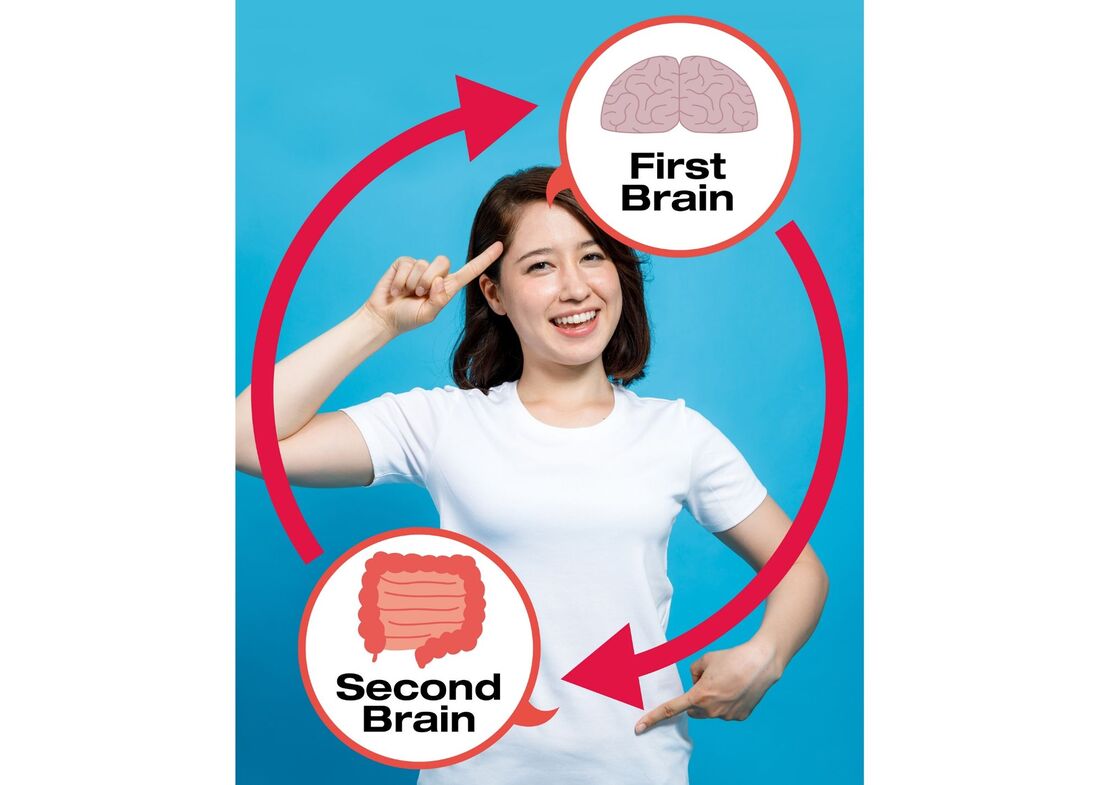|
Have you ever experienced that moment where you have some sort of deadline and you find yourself running out the door, in a mad dash, to make it on time? Noticing that both your mind and stomach are a bundle of nerves? Then all of a sudden you are forced to make an abrupt detour to the bathroom because your stomach has failed you? Or perhaps you can recall a moment when you have eaten something that has upset your body causing bloating and gas? This feeling then morphs into other ailments, creating a whole cascade of negative reactions.
Now you observe that you have a headache and you are experiencing that brain fog where your mind feels as though it is all over the place. Perhaps you have experienced a moment where your “gut” speaks up, providing you with an intuitive feeling to avoid a specific road or to not trust a particular person? Have you stopped to ask yourself why this is happening? Well, my friend, you are not alone. The gut-brain axis is a bidirectional circuitry that runs from your central nervous system (brain and spinal cord) to your enteric nervous system (a division of the autonomic nervous system that governs the gastrointestinal tract). The gut-brain axis is a powerful mechanism that governs how you feel emotionally and physically making it our “second” brain. Let’s break it down, shall we? Our brain is constantly sending or receiving messages whether it is in response to the external environment or sensing and responding to the happenings within the internal body. Breaking it down further, what governs these feelings are the bacteria inside of the gut. What! Bacteria!? Don’t worry, I was shocked too, especially to learn that these bacteria are often the “good guys” if taken care of properly. The bacteria within our body are responsible for manufacturing nutrients, breaking down food, and when balanced helps to neutralize toxins. The gut-brain axis aids in the creation of our neurotransmitters, which are chemicals that can make us feel happy or sad. One neurotransmitter, in particular, called serotonin, regulates our mood, digestion, and appetite. Although this neurotransmitter is often known for its role in the brain, scientists are finding that the vast majority, roughly 90%, are made in the gut. With the gut holding that much power it will not be surprising to learn that about 80% of the immune system is also located in the gut. What does this mean? It means that how one chooses to fuel their body will influence the microbiome thus impacting how one feels. Food can either encourage the body to repair and heal itself by providing the right building blocks and tools, or it can be destructive adding more stress in the body further breaking it down. The HPA axis (hypothalamic-pituitary-adrenal axis) is the center for stress response. Daily, our body is combating environmental, social, financial, emotional, physical, stressors that degrade and wear down the body. The immune system is responsible for fighting pathogens and microbes (the bad guys), where the nervous system is responsible for how the body communicates. So how is it our food choices play into these systems? Well, its time to connect the dots! Once the food is ingested, the process of digestion begins, once the food particles make their way into the small intestine, it is broken down into its smallest molecular form so that it can be assimilated and used throughout the body. At this point, bacteria and the immune system are doing their jobs by protecting the body. However, if the foods that are eaten are inflammatory by nature this will result in the system going out of balance. Unfortunately, this causes the body to work overtime. If the same inflammatory foods are repeatedly eaten, it causes the HPA axis to be on high alert, in turn overburdening the immune system. This also offsets the microbiome of the gut, allowing the “bad bacteria” to dominate offsetting the good bacteria. As you can see, food choices can create a snowball effect, impacting our bacteria which influences of physical symptoms (gas, bloating) and our mental symptoms (anxiety, brain fog, depression, neurotransmitter imbalance). This can worsen diseases or disorders already present, or enhance the predisposition of a disease/ailment to “turn on.” Now that this gut-brain connection is better understood let’s discuss the foods that commonly cause inflammation. Certain foods cause the body to experience stress which causes the body to breakdown. Think of a car, if you put the incorrect gas into the vehicle repeatedly, it will cause the mechanisms to malfunction. Our body is one phenomenal mechanism that relies on us to provide full support. By avoiding specific foods, or reducing the amount of intake, you are providing the body with building blocks rather than blocks that are faulty and will eventually break. Let's take a look at some of these inflammatory foods:
This quick list compromises the most food culprits that cause inflammation. How empowering is that to know that the food you choose to ingest influences how your body feels and how your mind feels? By avoiding inflammatory foods reduces the body’s destructive stress response, it lowers the activation of the HPA axis, promotes a healthy connection between the gut and the brain, aiding the body’s resiliency to stress and disease. These foods are a means of fueling your stress rather than fueling your body. The next time you feel disconnected from yourself, overwhelmed, overly emotional, unwell physically, bloated, gaseous, take a moment to check-in. Explore if these foods could be the culprit that is fueling the break down of your body rather than the build-up. Food is power, through these choices, one can reduce the destructive stress response, enhancing their health and vitality. This guest article is written by Sky Corbett-Methot a Holistic Nutritionist and 500 hour yoga and meditation instructor. Sky is a recent graduate of the Institute of Holistic Nutrition and a previous student of both Petra Sovcov and Tahlia Sage. She is a holistic healing and wellness coach that combines a unique “just for you” approach by utilizing movement, meditation, and nourishment to enhance vitality. Find out more at about SkyYoga & Wellness at: https://www.skyyogawellness.ca Or find her on Instagram @ sky_the_dauntless References:
0 Comments
Leave a Reply. |
Petra Sovcov is not a Medical Doctor (MD) nor a Naturopath (ND), she is a Clinical Herbal Therapist (CHT) and holds a Doctorate in Natural Medicine (DNM). The suggestions or recommendations made on this site are not meant to be a substitute for advice from your MD, or as a substitute for any prescriptions you may be taking. Suggestions followed will be the responsibility of the reader, and are stated with the intention of interest and education only. If you have a health issue, please see your primary care physician (MD) first and foremost. Categories
All
Archives
July 2024
|


 RSS Feed
RSS Feed